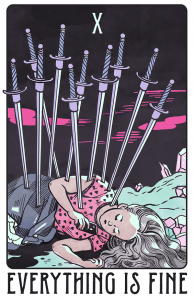Hi all! I have to make this quick because I’m currently recovering from a head injury, which means extremely limited screentime.
I’ve been pretty quiet lately, even before the injury. There’s a couple reasons for this. The first is that, now that I don’t get a benefit, I feel like my opinions about social welfare are less… valid, I guess. I mean, I’m still allowed to have them, but to be honest I’ve spent the better part of seven years writing about the many many ways in which our welfare system destroys people, and I got tired of repeating myself.
The second reason is just that I’m tired in general. Because I am in a relationship and therefore no longer qualify for any disability support, I need to work as much as I physically can. Which still isn’t much – I only work three days a week, but every day after work I come home exhausted. Stress exacerbates my illness and yes, going back to work, navigating my relationship, looking after my family and worrying about money are all impacting my health.
When Isaac Davison from the Herald contacted me for comment about the relationship rules, I was hesitant, but I felt like this is such an important topic, and that my experience is relevant.
Here’s the article, which shares a bit of my story and focuses on the work organisations like Auckland Action Against Poverty and Child Action Poverty Group are doing to try and get the relationship rules rewritten.
Of course, Isaac couldn’t include all my answers in the final piece, and I did feel that I articulated some really important points, so I thought I would put them in full here.

Image credit: Lisa Sterle.

Hi Sarah. Just checking to see if you and family are ok in these strange times. No need to reply just wanted to let you know I’m still here and interested in your writing when you are ready to publish more. 💓 Jane